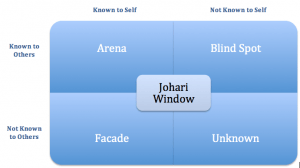Leadership demands not just guiding others but also understanding oneself using which can be revealed via Johari window. Even the most insightful leaders can have blind spots. A practical tool to uncover these is the Johari Window, developed by Joseph Luft and Harrington Ingham.
This model involves selecting adjectives that you believe define your personality from a comprehensive list, such as ‘adaptable’, ‘confident’, ‘intelligent’, and ‘warm’. Similarly, your peers pick adjectives they think describe you. These choices are then categorized into four quadrants: Arena, Blind Spot, Unknown, and Facade.
Arena within Johari Window:
This quadrant reveals qualities both you and your peers agree on. A larger overlap here signifies effective communication and embodiment of your values.
Blind Spot Revealed:
In the realm of leadership, self-awareness is a cornerstone. The Johari Window, a unique tool in this journey, reveals a particularly intriguing aspect: the Blind Spot. This quadrant represents the traits that others observe in you, but which you might not recognize in yourself. It’s a mirror held up by your peers, reflecting aspects of your personality that remain unseen or unacknowledged by your own introspection.
Discovering these hidden facets can be a transformative experience. It’s not just about identifying weaknesses or areas for improvement; often, it’s about uncovering strengths and capabilities you didn’t know you had. For instance, your team might see you as exceptionally adaptable or innovative – traits you’ve overlooked in your self-assessment. This revelation can be a powerful catalyst for personal and professional growth.
Moreover, understanding these perceptions is crucial for effective leadership. It helps bridge the gap between how you view yourself and how you’re viewed by others, leading to more authentic interactions and stronger relationships. It can also guide you in adjusting your leadership style to be more resonant with your team’s needs and expectations.
In essence, the Blind Spot area of the Johari Window isn’t just about uncovering hidden traits; it’s an opportunity to deepen your understanding of yourself as a leader. It encourages a more holistic view of your leadership capabilities, fostering a journey of continuous growth and self-improvement.”
This expanded paragraph delves deeper into the significance of the Blind Spot in the Johari Window, emphasizing its role in enhancing self-awareness and leadership effectiveness.
Unknown within Johari Window:
The ‘Unknown’ quadrant in the Johari Window is an intriguing and often uncharted area in self-awareness and leadership growth. It features traits and personality aspects that both you and your peers have not noticed. This quadrant is a reservoir of untapped potential, hidden strengths, and latent abilities. It represents parts of your character and capabilities that await discovery.
This quadrant’s presence in the Johari Window underlines the complexity and depth of human personalities. It suggests undiscovered dimensions of our character and abilities. For leaders, delving into this unknown space is both a challenge and an opportunity.
To engage with the Unknown, you must be willing to explore beyond your current self-awareness. This exploration requires deep self-reflection, seeking diverse feedback, and embracing new experiences. These steps can lead to significant personal growth and development, revealing previously unknown aspects of yourself.
For leaders, the Unknown is a source of strength and innovation. Uncovering new personality facets can lead to more adaptable leadership styles. It also enhances empathy and understanding of others, acknowledging the potential for diversity within each person.
Furthermore, exploring the Unknown leads to a more holistic and integrated self-concept. Uncovering and integrating these hidden aspects makes you more authentic in your leadership. This authenticity builds deeper connections and more effective leadership.
In conclusion, the Unknown quadrant in the Johari Window is not just a mysterious area; it’s filled with opportunities for growth and discovery. Embracing this journey can enrich your leadership skills, improve your self-awareness, and lead to a more impactful leadership presence
Facade Revealed:
These are the qualities you identify with but your peers don’t observe, highlighting areas where you might need to be more expressive.
Understanding these aspects of your personality through the Johari Window can significantly enhance your leadership. It’s about aligning your self-perception with how others perceive you, thereby leading with authenticity and effectiveness.
So, what might your blind spots be? What traits could others see in you that might surprise you? And what aspects of your personality might you need to share more openly?
Discover more about the Johari Window and its impact on leadership in our detailed post.




